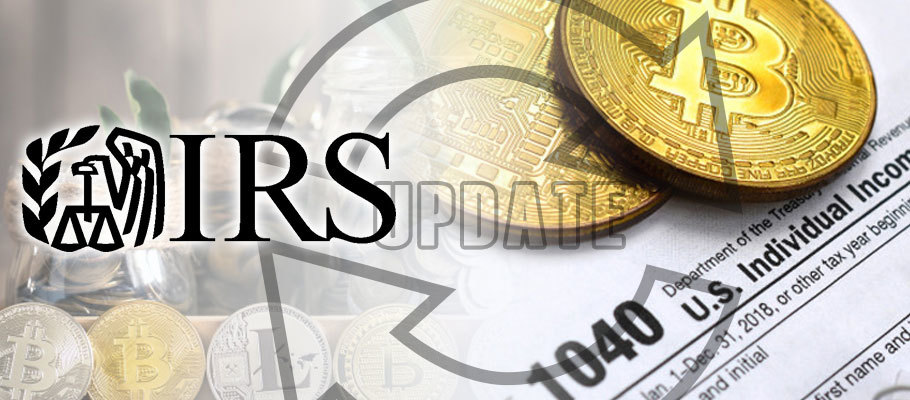
Published: September 9th, 2020
The Internal Revenue Service has issued an update of its cryptocurrency tax guidelines, which now provide for the taxation of virtual currencies that users receive for completing small tasks on crowdsourcing platforms. The update specifies how the agency treats cryptocurrency received in exchange for goods or services for tax purposes.
The Internal Revenue Service (IRS), the U.S. federal revenue service agency, has updated its cryptocurrency tax guidelines. The update defines cryptocurrency and how it is treated in light of taxation when received in exchange for goods or services.
In a memorandum that the agency recently released, individuals who receive digital currency from crowdsourcing platforms (bounty or airdrop) for their services should report such as ordinary income.
A query was recently brought to the agency’s attention regarding micro-tasks on crowdfunding platforms. Such tasks refer to jobs subdivided into small chores that are distributed via online platforms.
The IRS realized that platform users receive convertible cryptocurrency for completing these jobs. It said that regardless of the size of the payment (sometimes platforms pay less than $1 in crypto equivalent), this amount is taxable as ordinary income.
The IRS has heightened its crackdown on individuals who have outstanding tax dues from virtual currency transactions. Late 2019, it sent out more than 10,000 letters to crypto holders who it suspected had tax liabilities.
Under the current U.S. tax regulations, cryptocurrency is considered a property. Besides, taxpayers who fail to remit taxes owed from virtual currency transactions are liable to pay not only the penalties but also the interest accrued. In more severe cases, the agency might opt to prosecute the errant taxpayer.
The information is contained in a memorandum that was first reported by a leading online publication that reports on the blockchain and cryptocurrency news and opinion. In the memo, the IRS’s Office of Chief Counsel attempted to respond to a customer query. The June 29 request sought clarification from the agency’s Self-Employed/Small Business Division.
The query wanted clarification on whether crypto paid to an individual for completing minor tasks on crowdfunding platforms should be taxed. According to Ronald Goldstein, a senior technician reviewer at the IRS and the memo’s author, the convertible digital currency paid to individuals in the manner explained here above is taxable as ordinary income.
Goldstein reiterated that in such situations, cryptocurrency acts as a replacement for real currency. Therefore, it is considered as property for purposes of federal income tax, the IRS man added.
Goldstein stated that section 61(a) of the IRS tax code highlights these definitions, and the same should guide the tax agency in determining the liability due to an individual.
An example of the duties carried in the context of the definition above includes a company hiring and paying workers in cryptocurrency to review images or process data. Other examples include downloading an app and leaving a review, completing online quizzes, sharing the company’s posts on social media, downloading games, and attaining particular milestones. Companies might also ask users to create accounts on various service providers online.
Between 2016 and 2018, at the height of the initial coin offering (ICO) craze, many firms launching their coins used these micro-tasks for marketing purposes. In return, they paid the individuals who participated with a portion of the tokens set for distribution. The payments are known in the ICO world as airdrops or bounty.
According to the IRS memo, these tasks may become a source of reward for the individual participating. In situations where that reward comes in cryptocurrency, then such payments are subject to the same regulations that guide conventional income taxation.
The memo comes when the federal tax agency is cracking the whip to eliminate crypto tax evaders. However, these actions appear to contradict the advice given by their watchdog.
Two weeks ago, the agency sent out crypto soft letters to some 10,000 crypto holders. The memos targeting American taxpayers, inquire broadly about unpaid taxes or incorrectly filed virtual currency liability.
The letters and the recent memo are part of what the agency refers to as the soft letter campaign. Goldstein said that the IRS hopes to nudge taxpayers to the memos’ call-to-action so they can fix existing discrepancies in the tax filings before the agency escalates the situation to an audit.
When the IRS sent out the letters for the first time in September 2019, the Taxpayer Advocate Service, an internal watchdog, said the agency might have gone too hard, too fast.
The memo only adds to confuse crypto taxpayers who operate with little but are expected to achieve so much. The IRS has presented them with reams of incomplete tax guidance over how to approach hard forks, account for virtual currency transactions, report capital gains, to name just a few of the issues.
The internal watchdog recently complained about one variant of the IRS letters, 6173. It said that the memo undermines the taxpayer’s rights. By demanding that individuals provide statements of facts complete with detailed trading histories going down several years that lie outside the statute of limitations, the letter transgresses conventional bounds.
The watchdog also has a problem with the tone of these letters. In a report to Congress, Erin Collins, the Taxpayer Advocate, alleged that the letters violated the IRS conduct laws. It called upon the tax agency to emend the letters. However, the IRS does not seem keen to do so. A copy of the memo circulated to the media echoes the tone and demands of the predecessor.
The IRS has responded to a customer query regarding payment to platform users in crowdfunding platforms. In response, the tax agency said that revenues from micro-tasks performed on crowdfunding sites are subject to tax as ordinary income. The memo is part of a campaign by the IRS to crack down on individuals evading cryptocurrency tax.